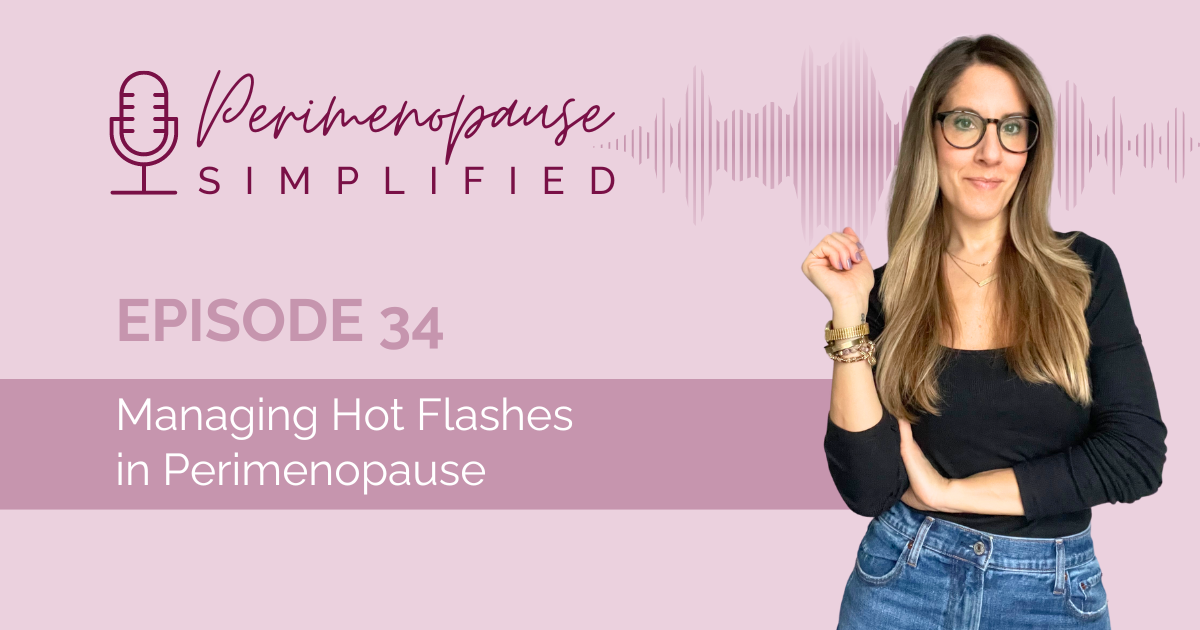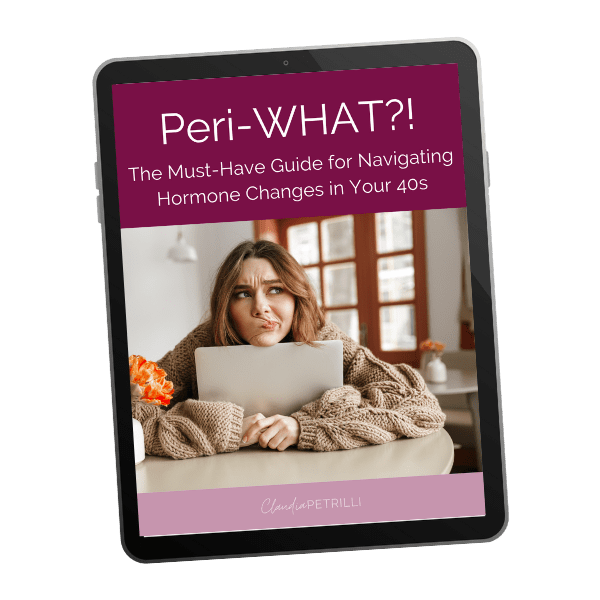
34. Managing Hot Flashes in Perimenopause
Don’t Miss An Episode!
In this episode, we covered:
- What are hot flashes?
- Causes of hot flashes in perimenopause
- Hormone imbalances linked to hot flashes
- How HRT can help with hot flashes
- Non-hormonal solutions for hot flashes
Common Perimenopause Symptoms
Do you wake up in the middle of the night drenched?
Do you have to sleep with one foot hanging off the side of the bed?
Do you need your own personal fan?
Well, you’re not alone. 80% of women experience vasomotor symptoms, known as hot flashes, flushing, and/or night sweats during the perimenopause to menopause transition.
The Impact of Vasomotor Symptoms on Health
Vasomotor symptoms can have a significantly negative impact on your health. Data shows that women who experience frequent vasomotor symptoms (6 days or more in a 2-week span) also experience higher rates of anxiety, depression, difficulty sleeping, and impaired quality of life.
🥵Hot flashes and night sweats can last, on average, for 7 years and can begin 5 years BEFORE menopause (remember the average age of menopause is 51, but it’s not the rule). It can happen in your 40s or mid to late 50s – we’re all different. So for some women, perimenopause symptoms can last up to a decade before cessation of periods. That’s a whole lotta time dealing with these temperature fluctuations!
You Don’t Have to Suffer
Ladies, I’ve said it before and I’ll say it again – you do not have to suffer in this stage of life. There are solutions, but you have to commit to your health, advocate for yourself, and be willing to invest in yourself.
Understanding Hot Flashes and Night Sweats
Hot flashes, which are a very common symptom of perimenopause, can cause sudden sensations of heat, sweating, or flushing, lasting from a few seconds to several minutes.
Night sweats are hot flashes that happen at night, and disrupt your sleep. And often, you may lose too much body heat, and feel cold afterward. Super annoying – it’s why we dress in layers!
The Link Between Hot Flashes and Cardiovascular Disease
Now, research suggests that the severity of hot flashes and night sweats is associated with an increased risk of cardiovascular disease. These are not completely benign, so it is important to address them.
What Causes Hot Flashes?
So what exactly is happening? Your hypothalamus (area of the brain that produces hormones) triggers hot flashes / night sweats to release the build-up of heat in the body, in response to an adrenaline surge (which is a stress hormone).
A drop in estrogen can be a primary trigger that causes a hot flash. But it can also happen with low progesterone, low serotonin, or high or low cortisol. This typically is due to blood sugar dysregulation – very common in perimenopause and why what you eat is so important.
How to Minimize Hot Flashes
Hormone Therapy
I’m sure you won’t be surprised to hear me say: hormone therapy. It is the most effective treatment for vasomotor symptoms. Hormone therapy use, specifically estrogen, not only reduces symptom frequency, but also the intensity by nearly 90%, usually within one month or so of starting. Progesterone can also help, and as I’ve said in previous episodes, you’ll want to replace both of these hormones.
Steps to Implement Now
-
The most obvious is to create a cool bedroom environment with a temperature around 65 degrees or lower, a fan if necessary, cool/breathable sheets, loose clothing, and keep pets and kids out of your bed – they give off a lot of heat!
-
Make sure you’re eating 3 meals per day, with at least 30 grams of protein per meal. And fill up on veggies! The protein and fiber will support blood sugar balance. You’ll want to aim for your ideal body weight in grams of protein and 25-30 g of fiber per day.
-
Reduce or avoid alcohol which can exacerbate hot flashes and other perimenopause symptoms like anxiety, depression, sleep disruption, and weight gain.
-
Reduce or avoid caffeine which can, in some women, exacerbate hot flashes and perimenopausal symptoms like anxiety and breast tenderness.
-
Consider consuming ground flax seeds and soy foods. These are known as phytoestrogens and contain estrogenic properties that can act like estrogen in the body. Phytoestrogens have a weaker estrogenic effect compared to the estrogen our bodies make. However, they can still be helpful when a woman suffers from low estrogen or wildly fluctuating estrogen. You’ll want to buy whole flax seeds and grind them yourself weekly. Keep refrigerated in a glass container so they don’t go rancid. Add 2 tbsp to yogurt or smoothies. When it comes to soy foods, quality really matters. Consume organic, non-GMO soy like organic edamame, miso, tempeh, tofu, and soy milk. Avoid soy protein isolate.
Supplements to Consider
- Black cohosh – it has serotonin-like compounds that can mimic estrogen in the body, thus can be helpful in supporting low estrogen symptoms, such as hot flashes and night sweats.
- Bee pollen extract which tends to help with hot flashes and sleep disturbances.
- Estrovera by Metagenics, which contains rhubarb, has been shown to reduce hot flashes.
- Maca, which is an adaptogenic herb that supports the (HPA) Hypothalamus Pituitary Adrenal axis to directly impact your own hormone production and balance. The brand I like is Femmenessence.
Long-Term Benefits of Hormone Therapy
While all these things can help with symptom relief, replacing hormones will also provide long-term health benefits and reduce your risk of chronic diseases.
Upcoming Program: Perimenopause Made Easy
Please be on the lookout for Perimenopause Made Easy, my 8-week live group coaching program, which delivers bite-sized education around the hormone changes happening in perimenopause and practical action steps to take, with an option to add an HRT consultation with me. If you’re considering hormone replacement therapy, but have questions…or you started HRT and need help troubleshooting, this add-on consultation is perfect for you. That program starts October 1st, so follow me on Instagram, because it will go on sale very soon.
Links Mentioned:
Cozy Earth (save 40% with code: HEALTHCOACHCLAUDIA)
Sources:
https://www.scirp.org/html/2617.html?pagespeed=noscript
https://www.ncbi.nlm.nih.gov/pmc/articles/PMC1949018/
https://pubmed.ncbi.nlm.nih.gov/32585222/
https://www.ncbi.nlm.nih.gov/pmc/articles/PMC3246070/
https://ods.od.nih.gov/factsheets/BlackCohosh-HealthProfessional/
https://pubmed.ncbi.nlm.nih.gov/16096172/
https://ncbi.nlm.nih.gov/pmc/articles/PMC9938702/
Claudia Petrilli is a Functional Health Coach, Integrative Nutrition Coach, Women’s Health Educator, and creator of The Hormone Rescue program. Having experienced debilitating periods, digestive issues, a sluggish thyroid, a pituitary tumor, and perimenopause symptoms in her late 30s, she knows exactly what it’s like to get dismissed by doctors and spend years searching for answers.
To connect with Claudia Petrilli:
FREE GIFTS:
Peri-What?! The Must-Have Guide for Navigating Hormone Changes in Your 40s
WORK WITH US: The Hormone Rescue Program
QUESTIONS? EMAIL: claudia@claudiapetrilli.com
LOVE THE SHOW?! Please subscribe, leave a 5-star rating, review, and share, so that other women can find this podcast for guidance and support through their perimenopause journey!
Peri-What?! The Must-Have Guide for Navigating Hormone Changes in Your 40s






